Richardson: The One Nation warning for SA Labor
The most ominous assessment of the challenges facing Peter Malinauskas’s mission to rebuild faith in Labor’s local brand comes, bizarrely, from a rising star of Australia’s far right, writes Tom Richardson.
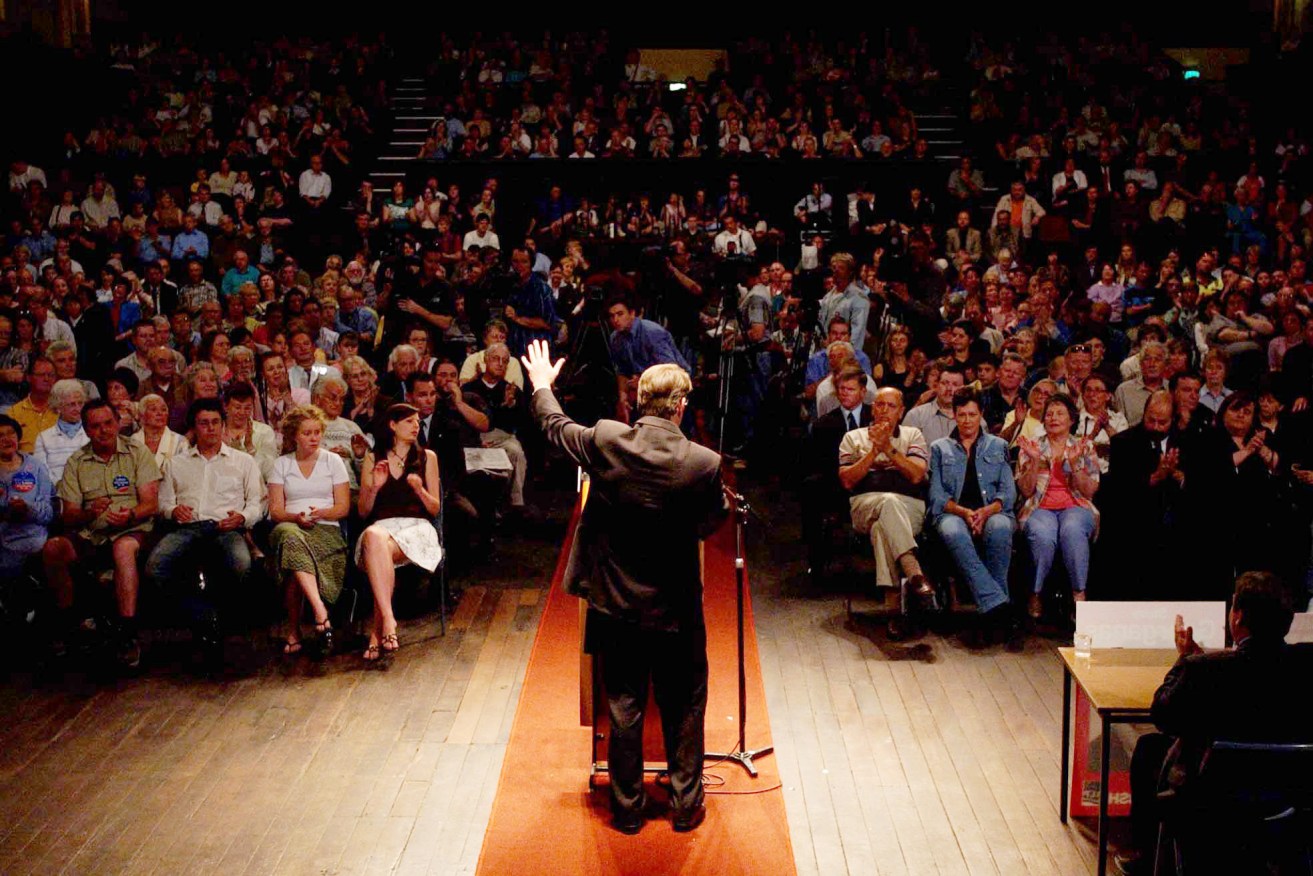
Mark Latham, as Labor leader, campaigning in Adelaide in 2004. Photo: Mick Tsikas / AAP
The other day I returned to what I regard as probably the most clear-eyed assessment of the reasons behind the recent election failure of Bill Shorten’s ALP.
“The Labor reform task is insoluble,” it lamented.
“The guiding reform principle of our time is the dispersal of economic, social and political power – but this is antipathetic to Labor’s culture of machine politics, trade union bosses and power hierarchies.
“The ALP is an Industrial Age institution, poorly suited to social justice issues in the Information Age… it is impossible to see this changing.”
There’s some irony in the fact that this passage, contained within one the most important critiques of contemporary Australian politics – and certainly of modern Labor politics – was written almost 20 years ago.
More ironic still is that it was written by the man who today heads up Pauline Hanson’s far-right One Nation Party in Australia’s most populous state.
But Mark Latham’s diary entry for December 28, 1999 – eventually published in 2005, after his brief political candle as Labor leader had flamed and sputtered – is almost prophetic about the fate of his party in the two decades that followed. Twenty years. Of which the ALP has governed for a mere six. And won a national parliamentary majority only once.
“Parliamentary politics is no longer a viable instrument of social reform,” he wrote on that day.
“The big issues are social – the breakdown in trust and compassion between people… but the state has no compass or toolkit with which to handle these issues.”
Instead, “it relies on the exercise of centralised, hierarchical power: law-making and bureaucratic control over people”.
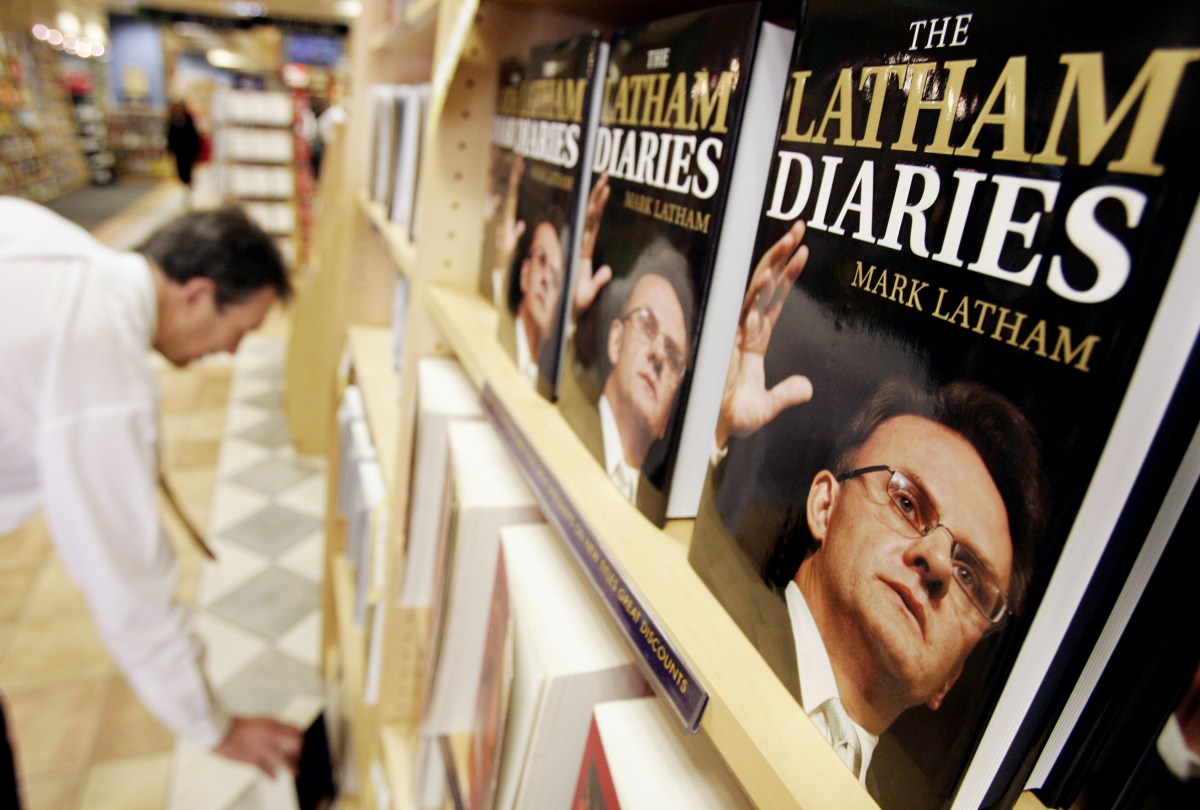
“The Latham Diaries” were fiercely criticised when the book hit the shelves, but the former MP’s analysis is worth revisiting. Photo: Rick Rycroft / AP
Beyond its frequently jaw-dropping anecdotes, then, the book is astoundingly prescient – not least when Latham presaged Kerryn Phelps’ candidacy in Wentworth by some 14 years (she was mooted as “some chance” of running for Labor in 2004).
But its real power of prophesy was about parliamentary politics, and Labor’s ability – or lack thereof – to adapt to a changing world order.
Remember that this was back in the pre-9/11 world, back when the Internet had but a fraction of its current pervasive influence on our daily lives, let alone public life.
Latham believed, even back then, that his former party was structurally ill-equipped to handle the political challenges of the contemporary world.
The ALP is an Industrial Age institution, poorly suited to social justice issues in the Information Age
“It is institutionally incapable of dealing with the big social policy questions: mutualism, devolution and civil society,” he wrote.
Those challenges are now far more acute, but the more things change, the more Labor has stayed the same.
When The Latham Diaries were published, they were roundly condemned, their author’s status as an overnight pariah confirmed.
Most critiques focussed on the frequent crudity, personality assassinations and indiscreet revelations.
Latham’s recent career trajectory – first campaigning against Labor as a member of the Liberal Democrats during the Longman by-election, and then propelled into the NSW upper house at the head of the One Nation ticket – is unlikely to invite any sympathetic revisionism among his former colleagues and True Believers.
And I’m certainly not arguing, one way or another, that there is a consistent or rational thread between his earlier ideology and his recent political positions or pronouncements (not least because I saw just this week a very fine essay in The Monthly which ponders just that).
Although it’s certainly true that he’s remained faithful to his theory that “the new politics” is about “defining yourself by provoking the right kind of opponents – that’s when a cynical electorate knows you mean it”.
Even if his idea of “the right kind” of opponents is itself deeply cynical.
Still, I’m not here either to castigate or praise Mark Latham as man or politician – but neither should we ignore him.
Because what was largely missed amongst the invective at the time was that Latham’s Diaries are probably the best, most accurate and most detailed document we have of the state of the modern ALP.
As such, it’s allowable to overlook the inherent hypocrisy in any such project, for the finest systemic critiques can only be made by those who have not merely worked within the system, but risen to the very top of it.
According to Latham, the Labor movement – like a government bureaucracy – hates innovation.
“It’s a threat to their conservative system of command and control,” he writes.
“We draw our talent and thinking from the old institutions of the Left: trade unions, political families and rorted branches.”
This was in 1999, at a time when Latham, as a maverick backbencher, was already contemplating quitting political life for academia: four years later he was Leader of the Opposition.
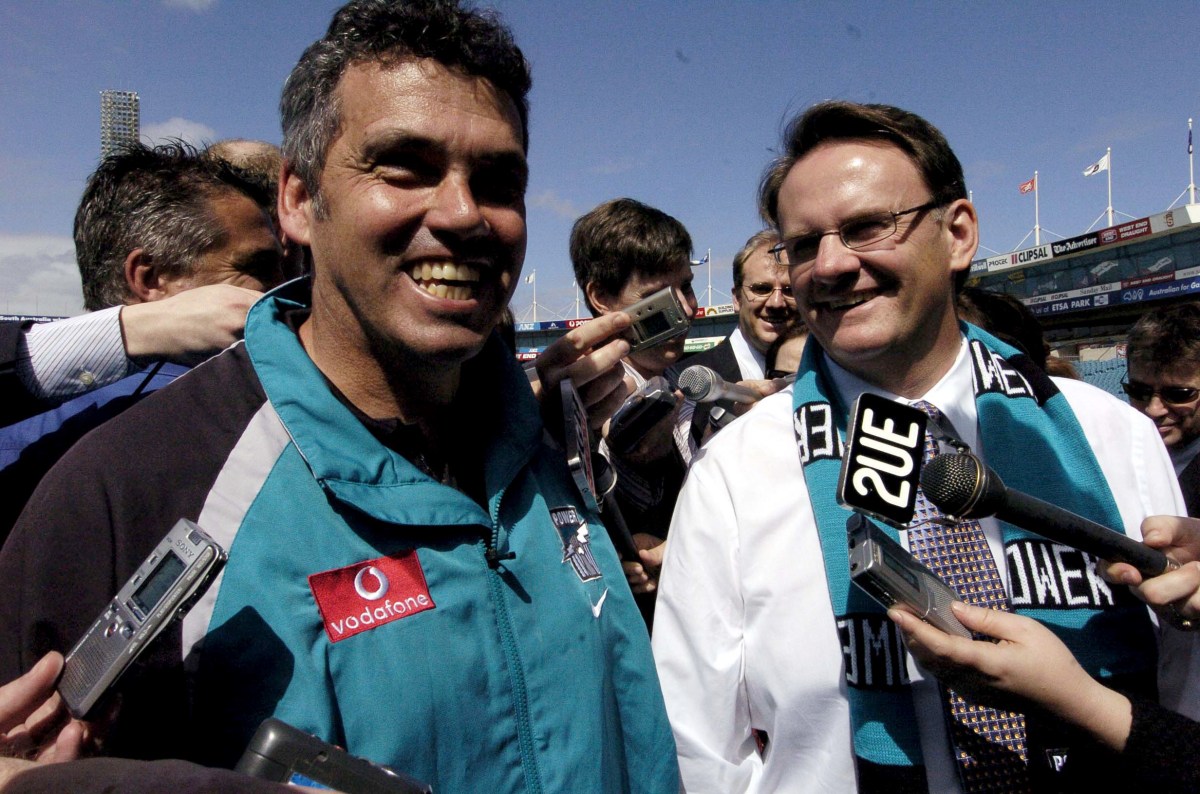
The then-Opposition Leader with Grand Final-bound Port Adelaide coach Mark Williams in 2004. Photo: Mick Tsikas / AAP
Over those two decades since however, Labor in SA has been as successful as its federal iteration has been hapless.
It won four elections and lost only one.
The reasons for this are many, but favourable boundaries clearly had an influence: after all, in all that time and through all that success, SA Labor only won a two-party majority once.
It’s arguable, too, that the state party was given some new lease of life because former Premier Jay Weatherill was, at least superficially, interested in the same broader ideas of political representation and disconnection that Latham was before him, dabbling with strategies geared towards making citizens feel more empowered in the political process (if not literally empowering them!).
But they tackled the same symptoms Latham identified when he noted that “the Australian people hate organised politics”.
“It is now part of the general malaise and distrust of all things public… even if Labor developed a modern reform program, the electorate would be reluctant to embrace it and trust in it,” he lamented.
“Under a barrage of media ridicule about politicians, people have become very cynical – they assume that new proposals have been devised solely to win votes [and] as the public becomes more cynical, the politicians become more opportunistic – a vicious circle.”
And true enough, Weatherill’s efforts at direct democracy – notions such as citizens’ juries and Fund My Neighbourhood – were a strange confluence of community engagement and cynical electioneering, but never quite escaped the stigma of the latter.
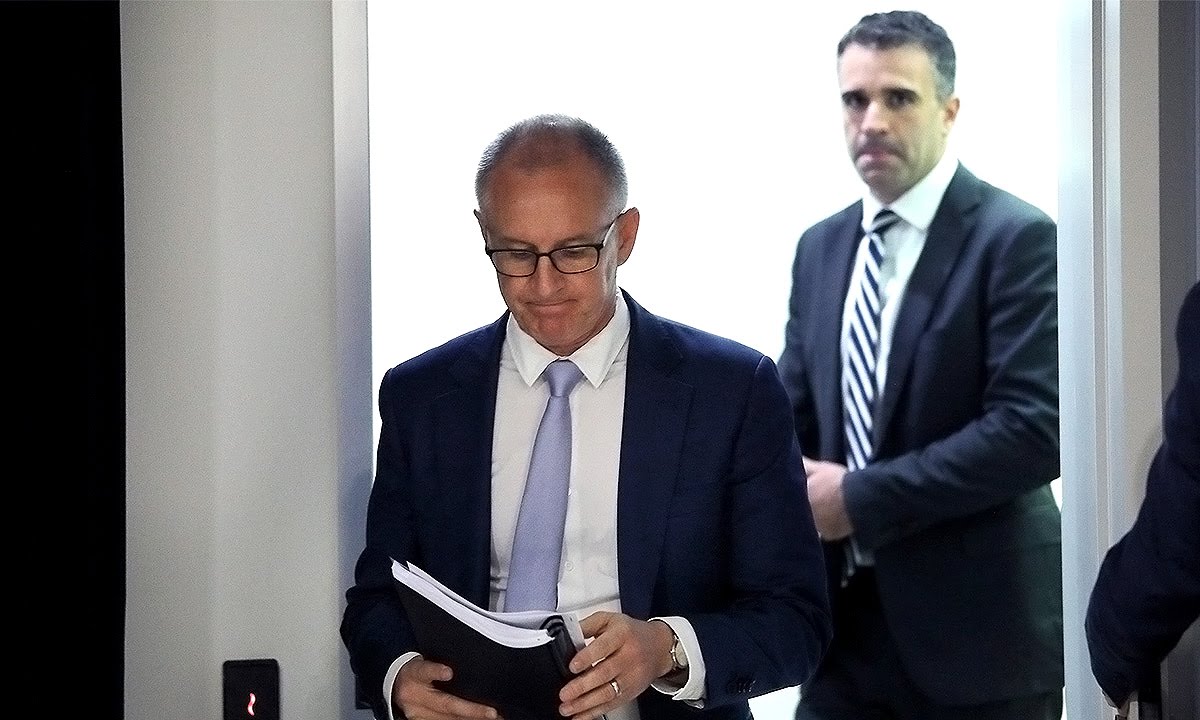
Weatherill with the man who would succeed him as Labor leader, Peter Malinauskas. Photo: Tony Lewis / InDaily
Latham’s focus was federal – indeed, after a run-in with former Victorian Premier Steve Bracks, he amusingly decried state politicians as “in it for themselves”, privately vowing to smash the legacy of state-based political machines and “abolish the primacy of the state branches”.
“They open a few schools and hospitals, and think they are King Shit,” he noted.
But there’s no doubt the cultural critique is as applicable to the state party as it is to the national machine.
We draw our talent and thinking from the old institutions of the Left: trade unions, political families and rorted branches
Last month, the SA Labor caucus met to debrief about its first year-and-a-bit in Opposition and gird its collective loins for the task ahead. Labor leader Peter Malinauskas has undertaken a thorough “listening” campaign, and is moving ahead with a broad review of Labor’s policy agenda.
But the agenda for the caucus love-in suggested an entirely conventional approach to machine Labor politics: the implications for state Labor of federal voting patterns, “community engagement”, campaign financing and electioneering training, rail privatisation “hotspots” (ie the fallow grounds for Labor MPs to plant seeds of discontent amongst wary commuters).
Indeed, this was the message the leader underlined to his colleagues as the key theme that could see them returned to office: bashing the Government on privatisation.
As Latham writes in his Diaries: “New ideas have become incompatible with the demands of daily politics (finding out what the public will support right now).”
“We need to regain our reputation as a serious party of conviction, rather than a machine party of opportunism and oppositionism that relies on the Senate to do our work,” he argued.
But in the years since, upper house obstructionism is increasingly the default tool by which Oppositions wield their influence.
In the past year, the Liberals have flailed on occasions, but rarely, if ever, because of anything that Labor has done.
The Opposition’s most significant contribution to the land tax aggregation debate has been to say nothing.
Its biggest parliamentary successes have not been to advocate for reform, but to block it – via the successful obstruction of the Government’s shop trading and council rate capping changes.
In Opposition, the defeat of such legislation is celebrated as a famous victory.
Labor in SA is now, literally, run by the factional machine; powerbrokers from the right and left occupy the two most senior positions in the party.
An inner sanctum of factional convenors – far more than the voters in their electorates – still dictates who represents the ALP in parliament.
Moreover, this is universally regarded as an efficient system, if brutally so; the internecine stoushes that bedevil the Liberal Party’s less stringent factions rarely trouble SA Labor these days.
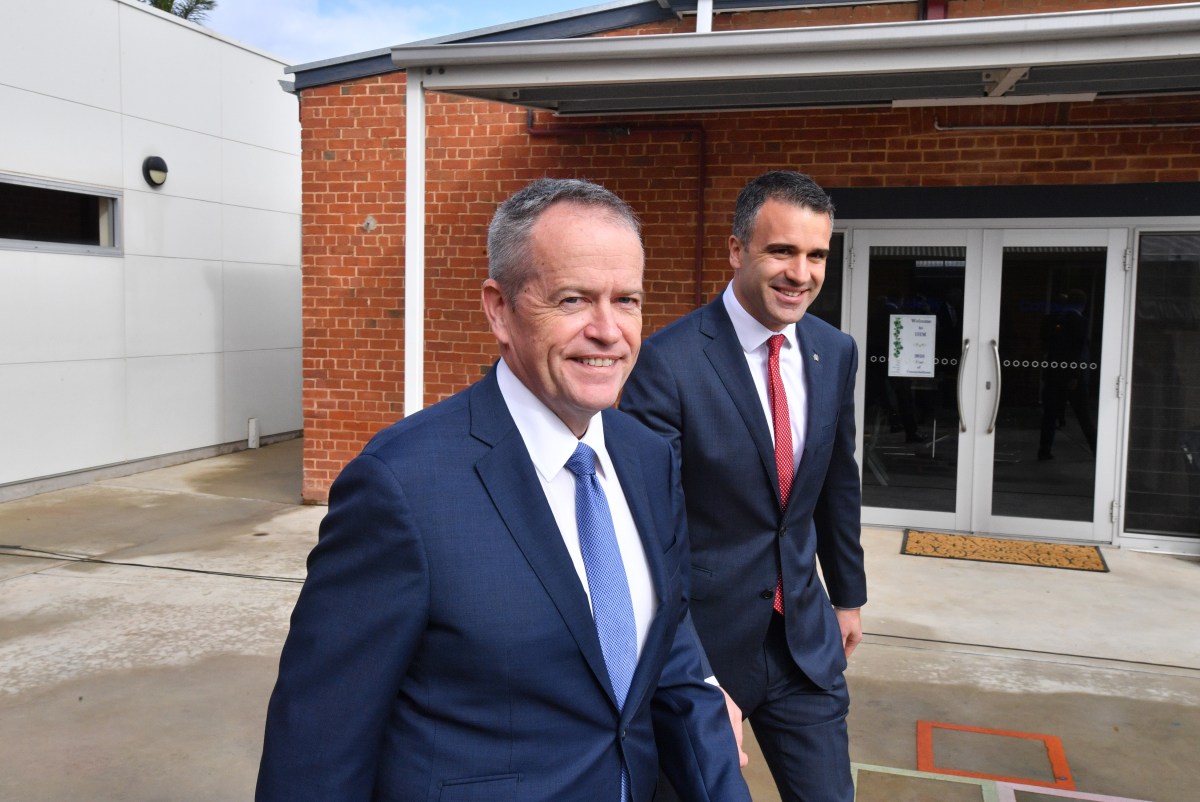
MACHINE MEN: Right faction powerbrokers turned Labor leaders Bill Shorten and Peter Malinauskas. Photo: David Mariuz / AAP
By 2001, and back on the frontbench, Latham wrote of a campaign briefing from NSW Right powerbroker Eric Roozendaal: “[His] remedy is not about fixing the core problem; rather, it’s about how we can squeeze a victory out of a deeply cynical electorate.”
“He recommends the use of what he calls ‘relationship campaigning’, interacting with voters one-on-one,” Latham recalled, recounting Roozendaal’s insistence that “research in the US has shown that if MPs interact three times with undecided voters over a two-year period, they triple their chances of getting their vote”.
“This is the new race to the bottom in politics,” Latham grumbled privately.
“Give up on policy, give up persuading people about issues, but try to strike up some kind of personal relationship with them – MPs as a cross between social workers and the Avon lady.
“It’s the sad decline in the content and serious intent of our democracy… the hollowing out of high-level trust: people don’t believe the major parties and their leaders any more, but they might vote for a smiling face and handshake down at the local shopping centre or train station.”
The sobering realisation from this passage is not that that was what machine politics was like in 2001, but how uncontroversially normal it seems now.
The state Liberals, indeed, were celebrated for finally getting their act together enough on campaigning to work out how to tailor messages door-to-door – using data-mining technology, of course (as both parties do).
During the last state election I conducted a brief experiment, following MPs round the streets of their electorates for a few hours as they pressed the flesh in the campaign “ground war”. You could tell even then that the personal campaign of SA Best leader Nick Xenophon was doomed – no matter how widely his anti-establishment rhetoric was resonating, he simply hadn’t allowed himself, or his candidates, the time to “strike up some kind of personal relationship” with their prospective electors.
The micro focus of campaigns is now seen as the main game – targeting the message not merely to the seats needed for victory, but to the doorsteps of the households needed to win them.
People are preselected – and re-selected – not for policy heft, but for their ability to mount a compelling marginal campaign.
The electoral cynicism at which Latham scoffed in 2001 has become received convention, with a generation of aspiring MPs trained in the art of Avon-style direct-sale campaigning.
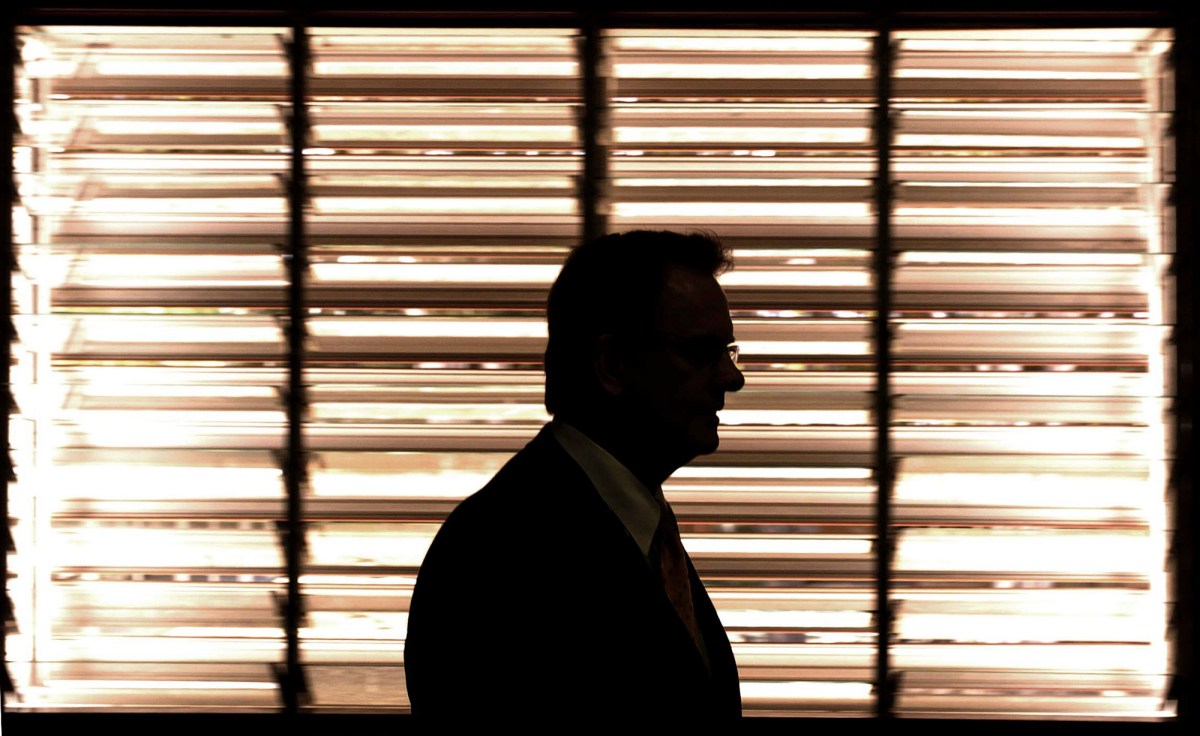
Mark Latham forecast the challenges his party would go on to face in the early 21st century. Photo: Mick Tsikas / AAP
For all his flaws as a mainstream politician, Latham was always a perceptive analyst. His “third way” approach to reinventing politics – identifying the fundamental dichotomy as not between Left and Right, but insiders and outsiders – captured the political zeitgeist of the 21st century back in the 20th, neatly explaining the rise of many global fringe movements, including the rebirth of the party he now represents.
He understood that the media were part of the “insider” culture, noting a “huge disconnection between the electorate and the [press] gallery”.
“The public is deeply cynical about the system… yet the media is the funnel by which these artificial messages and processes are conveyed,” he wrote.
“They see politics as a game, not real life – and encourage the MPs to play it.”
This is the new race to the bottom in politics – MPs as a cross between social workers and the Avon lady
It’s telling that the ridicule with which the book was originally portrayed in the public realm was generated by that same media that he so clearly reviled.
But it’s also telling that the influence of the media has waned in the 21st century, even beyond falling revenues and circulation.
People now see us – all of us – as part of the establishment. And they’re generally right.
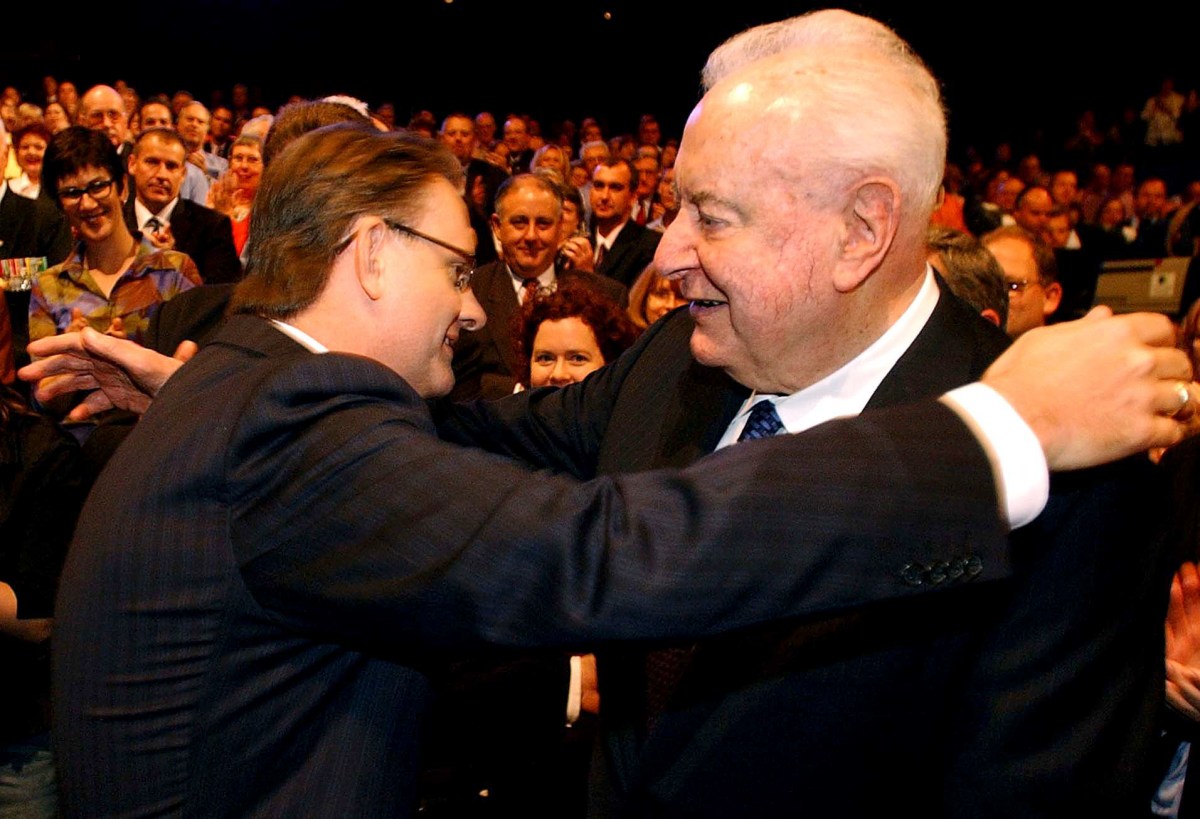
Now derided as a Labor ‘rat’, Latham was once an understudy to the party’s revered former leader Gough Whitlam. Photo: Mick Tsikas / AAP
Federal Labor is no doubt hoping for renewal under Anthony Albanese by trading on his “outsider” status – in a previous ballot against Bill Shorten, he won the grassroots vote but was undone by the factional hegemony of the caucus.
But in reality, Albanese is the archetypal Labor machine man – a product and architect of the party’s devotion to factional patronage that for all its governance efficiencies has doubtless also promoted mediocrity and stifled the evolution of ideas.
Likewise, when state Labor talks of renewal, it merely means that type of superficial renewal it hopes will return it to high office; its “new politics” isn’t about rejecting machine politics, but elevating it.
After all, as Latham wrote of the factional operators within his own ranks: “They came here to run the place, not give power away.”
Tom Richardson is a senior reporter at InDaily.




